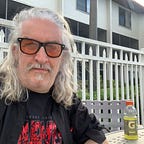Spotlight series #53 : Alina Stefanescu
Curated by Canadian writer, editor and publisher rob mclennan, the “spotlight” series appears the first Monday of every month.
Writer’s Statement
1.
I’ve been trying to reconcile the self with the borders of multiple identities. Perhaps parenting forces these thoughts to the surface somehow — for example, why I identify as Romanian-Alabamian rather than Romanian-American; and how the word “unamerican” has been used to describe (and shame) me so often that pinning “American” to myself feels like a moving target. Alabamian is easier if only because saying unalababamian is phonetically clunky and awkward and therefore most humans don’t invite it to their tongues.
If I write about the South and was socialized in the South, am I Southern? This is a question which depends on how I write the South. Every tough word I use is a wall I build in defense against the walls that I blame others for building and I have no self-defense against the irony and uselessness of that apart from my culpabilities.
2.
Nostalgia fascinates me, and I am guilty of idealizing this lost homeland where I imagine feeling safe or known or accepted. I think many immigrants do this. I think it’s a temptation. We humans do terrible things with nostalgia and nations. In Romania, nationalist nostalgia has been used to erase and stigmatize Romany persons for centuries. Ceausescu’s solution involved completely assimilating the Roma by ending their cultural practices and traditions. Maybe there is something to learn from the dictator’s attempt at “assimilation,” and how nationalism anywhere — under any political creed, right or left — perpetuates harm against minority cultures and languages.
3.
Most of my life has been lived in Alabama, where the needle makes fun of the haystack, and “fun” is sometimes very scary and violent. This may be true of other states, but I can’t speak of those states in earnest — I can only describe what I have seen here. Many people are afraid to describe what happens in their homes for fear of losing a family or being shunned.
Life in the South has its own iconographies, and many are tied to a notion of heritage that is plays the same role as nationalism in Eastern Europe. Nativism is a big deal in Alabama, and conspiracy theories tied to birth-right can make or break political elections. There is a stunning absence of elected immigrant leadership in my home state. As Denny Chimes noted in his Rose Bowl speech, football is how the South “redeems the Southland”.
On that note, there is no single Romanian word for “fun” and I love that about Romanian — I love that longing is a complex form of joyous melancholy and fun is commercially absent from text. I am lucky and I am complicit and those two things can coexist in many of us until purity becomes a test.
So I’ve included a poem from the manuscript about longing — and the word for that, which is dôr — and I’ve included a poem from the manuscript about being a Southerner, and knowing “my place” is hazy.
TWO POEMS
Today We Are Archaeologists
The tin cups do their best
to look brazen as we trace
them on special drawing paper
on the morning lab scientists
warn against consuming
hypersexual zombie cicadas
infected by psychoactive
fungus. I try shimmying
outside this body
when I spy tiny horses
in my daughter’s eyes, hooving.
We discuss civilized materials,
the seeds of imperial claims,
how nations get made out of
nowhere. We tend the lot of
unwatered dahlias, our thirsty
country without proper
wood beds or borders.
A strange dog poops
on our porch, his eyes lit
like torches for freedom.
I have zero hallelujah
when scripture divides oak
leaves from wandering
larkspur tongues.
My daughter saw the pony
in an ad for fast scooters.
The scale of desire
inverses what comes first
is the kiss we remember.
A position rooted in primacy
needs the paper muscle
of who owned the land
at the outset. Who was
the point of origin. And
who was the ramp
chained to it.
Self-Portrait with Lost Marble
Try the next house, I told the burglar.
I have the street’s poorest spirit.
I’m just a low-bust woman loathed by
in-laws. I’m just a sprawling who is
clutching a marble as the neighbor’s blue plaster
Virgin stares me down over a birdbath.
Wrong story, wrong yard for angel angles,
I told the thunder. Guilt keeps me glued
to love like the anklet one hides to keep
from losing. Note the silence I didn’t
sweep from the porch. In summation,
I am everything you thought up & worse:
an accordion of scabbed knees, a tulip-
faced gauntlet near the tree, where
a squirrel marks its territory with a
soliloquy of tail flicks & twitches, then
inches up a trunk and marks again.
I let go, eye the wren.
Alina Stefanescu was born in Romania and lives in Birmingham, Alabama with her partner and several intense mammals. Her writing can be found in diverse journals, including Prairie Schooner, North American Review, FLOCK, Southern Humanities Review, Crab Creek Review, Virga, Whale Road Review, and others. She serves as Poetry Editor for Pidgeonholes, Poetry Editor for Random Sample Review, Poetry Reviewer for Up the Staircase Quarterly, and Co-Director of PEN America’s Birmingham Chapter. She was nominated for 5 Pushcart Prizes by various journals in 2019. A finalist for the 2019 Kurt Brown AWP Prize, Alina won the 2019 River Heron Poetry Prize. She still can’t believe (or deserve) any of this. More online at www.alinastefanescuwriter.com.
